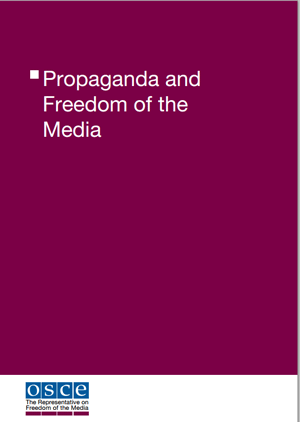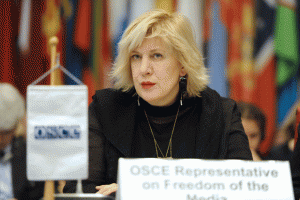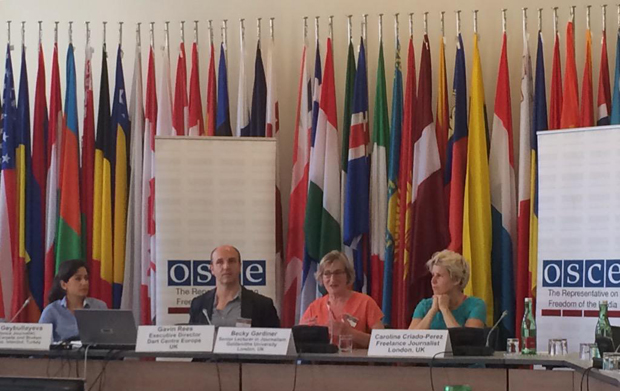3 Dec 2015 | Europe and Central Asia, Mapping Media Freedom, mobile, News and features
 Propaganda, counterpropaganda and information wars are all terms that, unfortunately, have become part of our daily discourse.
Propaganda, counterpropaganda and information wars are all terms that, unfortunately, have become part of our daily discourse.
As the Organization for Security and Co-operation in Europe (OSCE) Representative on Freedom of the Media, I have raised the issue of propaganda emanating from the conflict in and around Ukraine. I have called propaganda an ugly scar on the face of modern journalism and called on governments to get out of the news business.
Tackling propaganda is not a new concept to the participating states of the OSCE. It goes back to the beginning of this organization. At the time of the Helsinki Final Act, the participating states committed themselves to promote “a climate of confidence and respect among peoples consonant with their duty to refrain from propaganda for wars of aggression” against other participating states.
Those promises were broken for the first time before and during the war in former Yugoslavia in the 1990s. Dangerous stereotypes that dominated state media since the beginning of the crisis significantly contributed to the development of an intolerant atmosphere and influenced people’s beliefs and increased feelings of national and religious differences.
Creating an environment of fear and general anxiety, with constant labelling of enemies was now expanded to nationalities. Ethnic intolerance, built by cleverly devised propaganda in the media, resulted in general support for a brutal war. Many studies and much research about the role of media in the former-Yugoslav conflict indicated that media, while serving the regime, produced war and hatred.
Fast forward to 2015. The media landscape has changed almost completely, but journalism still suffers from propaganda and its wicked elements. In the 21st century, where new technologies are bringing information – and journalism – to readers in new ways and faster than ever before, propaganda is alive and doing very well.
It is apparent that some media are in dire need of self-examination. There is a need to cleanse journalism of fear, propaganda and routine frustration. In the absence of critical journalism, democracy suffers and deliberate misinformation becomes the standard.
In the past 12 months my office has been heavily engaged in a campaign on several fronts to attack the root causes of propaganda and its all-too-likely consequences: ignorance, hate and hostility. My team has spent considerable time and resources working with Russian and Ukrainian journalists in confidence-building measures designed to bridge the gap between them. We have instituted training for young journalists from the two states on such topics as ethics in journalism, conflict reporting and propaganda.
The latest element in our campaign against propaganda was just published: Propaganda and Freedom of the Media offers an in-depth look at at the legal and historical basis against propaganda.
The report recommends that:
- Media pluralism must be enforced as an effective response that creates and strengthens a culture of peace, tolerance and mutual respect.
- Governments and political leaders should refrain from funding and using propaganda.
- Public service media with strong professional standards should be strongly supported in their independent, sustainable and accessible activity.
- Propaganda should be generally uncovered and condemned by governments, civil society and international organizations as inappropriate speech.
- The independence of the judiciary and media regulators should be guaranteed in law and in policy.
- The root causes of propaganda for war and hatred should be dealt with a broad set of policy measures.
- National and international human rights and media freedom mechanisms should be enabled to foster social dialogue in a vibrant civil society and also address complaints about incidents of hateful propaganda.
- Strengthening educational programmes on media literacy and internet literacy may dampen the flames that fire propagandists.
- Media self-regulation, where it is effective, remains the most appropriate way to address professional issues.
Propaganda does a disservice to all credible, ethical journalists who have fought for and, in some cases, given their lives to produce real, honest journalism. In sum, propaganda for war and hatred is effective only in environments where governments control media and silently support hate speech. A resilient, free media system is an antidote to hatred.
My hope is that the report Propaganda and Freedom of the Media will assist OSCE participating States, policymakers, academia and media professionals throughout the OSCE region and beyond.
6 Oct 2015 | Belarus, Europe and Central Asia, Mapping Media Freedom, mobile, News and features

In Belarus, dozens of freelance journalists were fined between 2014 and 2015 for working for foreign media without an accreditation from the Ministry of Foreign Affairs. In a country dominated by state-run media, foreign outlets offer an alternative source of information.
Under Belarusian law, freelance journalists who co-operate with foreign media outlets are not considered legal employees of the organisation in question and aren’t entitled to receive the required accreditation. The first freelancer penalised was videographer Ales Dzianisau from Hrodna, a city in western Belarus. He was accused of illegally producing a video which ran on Belsat TV — a Polish state-run channel aimed at providing an alternative to the censorship of Belarusian television — about the opening night of a rendition of Goethe’s play Faust. He was fined €300.
Under Article 22.9(2) of the Belarusian Code on Administrative Offence, the courts can judge journalistic activities without an accreditation as illegal. In each case, the reason for the journalist having committed an offence was not the content of their work, but that they were published through foreign media.
As a rule, the police must consult witnesses — usually a person who was interviewed by the journalist — to prove that a work was made by the journalist accused. This doesn’t always appear to be the case.
An article published by Aliaksandr Burakou on the German website Deutsche Welle resulted in court hearings, talks at the tax office and the seizure of flash drives and computer systems. On 16 September 2014, Burakou’s apartment was searched, as was that of his parents. The journalist was charged with work without accreditation and fined €450. Burakou’s appeal to the country’s Supreme Court was rejected in May 2015.
The Belarusian Association of Journalists (BAJ) strongly condemns the continued prosecution of freelancers. It called the prosecutions a gross violation of the standards of freedom of expression.
In December 2014, OSCE Representative on Freedom of the Media Dunja Mijatović wrote in a letter to the Minister of Foreign Affairs of Belarus, Vladimir Makei, stating: “These undue restrictions stifle free expression and free media. Mandatory accreditation requirements for journalists should be reformed as they hinder journalists from doing their job.” She reiterated her call on to stop imposing restrictive measures on freelance journalists in April 2015.
The European Federation of Journalists (EFJ) issued a statement on the situation at its June 2015 annual meeting. It called on the Belarusian authorities to drop the practice of holding freelancers accountable for work without the accreditation. The union also called on the OSCE and the Council of Europe to pay more attention to violations of freelancers’ rights in Belarus.
Nevertheless, since the beginning of 2015, 28 Belarusian journalists have been fined with 23 of those cases taking place in the last six months. Since April 2014, 38 freelance journalists have been fined €200-500, totalling over €8,000.
Dzianisau, the freelance cameraman penalised for making video reports in Hrodna, said: “The most complicated thing for me in this situation is that the authorities shut off the air. At present, I cannot report in the history museum or the museum of religions. I cannot report in the puppet theater, and now in the exhibition hall on Azheshka Street.”
Some freelancers have been brought to trial several times during this period. Kastus Zhukouski has been fined six times and Alina Litvinchuk four times. Some see the pressure on the media in Belarus as increasing due to the upcoming presidential elections on 11 October 2015.
Not so long ago, President Alexander Lukashenko was asked what should be done about journalists receiving fines. In response, he acknowledged that the practice was improper and the matter should be investigated by his press service.
However, many Belarusian freelancers do not believe their situation will change soon. Larysa Shchyrakova, a freelance journalist from Gomel who has been penalised twice this year for co-operating with foreign media, said: “I do not believe there will be any liberalisation because it is contrary to the logic of the authorities. The system in Belarus is ineffective and the prosecution of journalists will always be a priority for the government.”
Mapping Media Freedom
Click on the bubbles to view reports or double-click to zoom in on specific regions. The full site can be accessed at https://mappingmediafreedom.org/
|
1 Oct 2015 | European Union, mobile, News and features

Dunja Mijatovic is the OSCE Representative on Freedom of the Media. (Photo: OSCE/Micky Kroell)
Each autumn, more than 1,000 government and civil society representatives from 57 countries of the OSCE get together in Warsaw for a two-week discussion on a wide variety of human rights issues. The purpose of the meeting is to scrutinize each country’s performance on human rights standards they signed up to in areas such as free expression, free media and the panoply of basic rights prevalent in modern, liberal societies. It is designed to be a thoughtful and lively event that gets to the heart of implementing states’ commitments on the issues.
This year the first topic was dedicated to freedom of expression and the keynote speaker, Danish human rights lawyer Jacob Mchangama, raised “the issue du jour”: “Does a genuine commitment to tolerance, equality and nondiscrimination really depend on restricting the very freedom that has made possible the articulation and spread of new and progressive ideas from religious toleration in 17th century Europe, the abolishment of slavery, the equality of the sexes, criticism of apartheid and the rights of LGBT people?”
The issue, of course, is whether we need the spate of new laws enacted worldwide designed to somehow strike a balance between the right of free expression and the desire to weed out intolerance and hate in society.
In the wake of the Charlie Hebdo massacre in January, the answer to Mchangama’s question may well form the superstructure of the rights to free speech in the years to come.
We don’t need new laws. Indeed, it is time we stop looking at unbridled speech as something that promotes intolerance. We should see it as an opportunity to protect the rights of minorities and marginalised people to speak when the powerful are making distressing noises.
My reasoning is based on the simple view that when it comes to media freedom, those who govern least, govern best.
Even the best-intentioned laws cannot prevent intolerant speech. And general notions such as “hate speech” preferably should be avoided because they can be arbitrarily interpreted.
It is a decidedly New Age thought, likely first made popular by the 19th century essayist Henry David Thoreau in his essay on Civil Disobedience.
But today it is commonly thought that laws criminalising hate speech are beneficial to marginalized groups that need state protection. In reality, it is the marginalized groups who need the freedom of speak without fear of prosecution to press their causes and affirm their rights in society.
As Mchangama said in his address: “The freedoms that (sometimes) allow bigots to bait minorities are also the very freedoms that allow Muslims and Jews to practice their faiths freely. By further eroding these freedoms, no one is more than a political majority away from being the target rather than the beneficiary of laws against hatred and offence.”
Indeed, a significant development post-Charlie Hebdo has been the distressing comments by some that openly suggested the magazine’s staff “had it coming to them” for publishing illustrations satirising the prophet Muhammad. Just think of it: the victims of an outrageous act of silencing speech actually became, in some people’s eyes, the guilty ones.
It is time for some civility in the chaotic world of free speech. As I wrote shortly after the attack: “Intolerant speech should be primarily fought with more speech.” I still believe that is the foundation of any attempts to regulate content.
Following that line, I suggested, among other things, that participating states (the member countries of the Organization for Security and Co-operation in Europe):
· Refrain from banning any form of public discussion or critical speech, no matter what it refers to;
· Take all possible measures to fight all forms of pressure, harassment or violence aimed at preventing opinions and ideas from being expressed or disseminated; and
· Eliminate restrictions to freedom of expression on the exclusive grounds of hatred, intolerance or potential offensiveness. Legislation should only focus on speech with can be directly connected to violent actions, harassment or other forms of unacceptable behavior against communities or certain parts of society.
My full statement on this issue.
22 Sep 2015 | Austria, mobile, News and features, United Kingdom

Panelists at the OSCE meet on online attacks against journalists: writer Arzu Geybulla; Gavin Rees, Europe director of the Dart Center for journalism and trauma; Becky Gardiner, from Goldsmiths, University of London; journalist Caroline Criado Perez
“This is not something that only ‘ladies’ can fix,” emphasised Dunja Mijatovic, the OSCE’s Representative on Freedom of the Media at an expert meeting on the safety of female journalists in Vienna on 17 September 2015, which Index on Censorship attended.
The importance of collectively tackling the growing problem became an overarching theme of the conference. “There is a new and alarming trend for women journalists and bloggers to be singled out for online harassment,” said Mijatovic, while highlighting the importance of media, state and NGO voices coming together to address the abuse.
Arzu Geybulla and Caroline Criado Perez, journalists from Azerbaijan and the UK respectively, started the meeting with moving testaments of their own experiences. Despite covering very different topics, they have received shockingly similar threats – sexual, violent and personal. “Shut your mouth or I’ll shut it for you and choke you with my dick” was one of the messages received by Perez after she campaigned for a woman to feature on British banknotes.
Although male journalists also receive abuse, women experience a two-fold attack, including the gendered threats. Think tank Demos has estimated that female journalists experience roughly three times as many abusive comments as their male counterparts on Twitter.
The problem, said Perez, was not just the threats but how the women who receive them are then treated. “Women are accused of being mad or attention seeking, which are all ways of delegitimising women’s speech,” she said. “People told me to stop, close my Twitter account, go offline. But why is the solution to shut up?” She added: “This is a societal problem, not an internet problem.”
“Labelling a person, and making that person an object, is particularly common in Azerbaijan,” said Geybulla, an Azeri journalist and Index on Censorship magazine contributor who was labelled a traitor and viciously targeted online after writing for a Turkish-Armenian newspaper. “Our society is not ready to speak out. You can’t go to the police. The police think it must be your fault.”
The intention of the meeting was to highlight the problem, while also proposing courses of actions. Suggestions included calls for more education in digital literacy; more training for police; more support from editors and media organisations, and from male colleagues. There was some disagreement on whether the laws were robust enough as they stand, or needed an update for the internet age.
Becky Gardiner, formerly editor of Guardian’s Comment is Free section, spoke about how her own views on dealing with online abuse had changed, having initially told writers they should develop a thicker skin. “It is not enough to tell people to get tough. Disarming the comments is not a solution either. That genie is out of the bottle.” Gardiner, who is now a lecturer at Goldsmiths, University of London, is working on research into the issue, as commissioned by the Guardian’s new editor, Kath Viner.
It was suggested that small but crucial steps could be taken by media organisations to avoid inflammatory and misleading headlines (which are not written by the journalist, but put them in the firing line) and to be careful of exposing inexperienced writers without preparation or support. Sarah Jeong from Vice’s Motherboard plaform said, in her experience, freelancers often came the most under attack because they don’t have institutional backing.
The OSCE said this will be the first in a series of meetings, with the aim of getting more organisations to take it serious and to produce more concrete courses of action.
Read more about the online abuse of women in the latest issue of Index on Censorship magazine, with a personal account by Gamergate target Brianna Wu and a legal overview by Greg Lukianoff, president of the Foundation for Individual Rights in Education (Fire).
Tweets from OSCE’s #FemJournoSafe conference:
https://twitter.com/julieposetti/status/644456066432937984
 Propaganda, counterpropaganda and information wars are all terms that, unfortunately, have become part of our daily discourse.
Propaganda, counterpropaganda and information wars are all terms that, unfortunately, have become part of our daily discourse.


